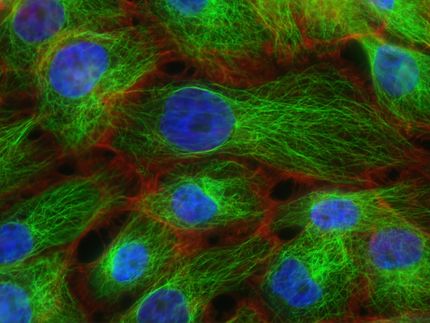Researchers at IRB Barcelona uncover new clues about the origin of cancer
Different kinds of tumors start to develop as a result of specific combinations of errors in the processes that safeguard cell integrity
A study by Travis H. Stracker, researcher at the Institute for Research in Biomedicine (IRB Barcelona), in collaboration with scientists at the Memorial Sloan Kettering cancer Center (MSKCC) in New York, reveals new information about the origin of tumors. In this study, published in the journal Proceedings of the National Academy of Sciences (PNAS), the scientists postulate that the initiation of a tumor and the type and aggressivity of the same depend on a specific combination of defects in several processes that safeguard cell integrity, such as DNA repair pathways and cell cycle check-points. The study also demonstrates that mice with a high degree of chromosomal instability and defective programmed cell death (apoptosis), two hallmarks of cancer, rarely develop tumors.
"Whether or not a tumor develops depends on the moment of the cell cycle in which the damage occurs, which repair pathways components are affected, and which others are impaired in terms of apoptosis and cell cycle arrest", explains the North-American Travis H. Stracker, head of the "Genomic Instability and Cancer" group and an expert in DNA repair pathways and its implications on human health. In this study, H. Stracker and his team report on some of these combinations for the initiation of cancer and in different kinds of tissue. "The paper points out that our understanding of which aspects of damage response promote tumorigenesis and where they play a role in the process needs to be investigated further because it shows that it has been generalized and that there is a lot of specifics that are not at all clear."
The researchers utilized mice carrying mutations in key DNA repair genes involved in cancer. Next, they combined them with other mutations affecting cell cycle checkpoints or apoptosis until they hit upon the combinations that are sufficient to initiate tumorigenesis or to generate certain types of tumors. "It is like deconstructing cancer to find the factors responsible for it appearing", says H. Stracker.
During DNA replication in a dividing cell there is a series of checkpoints to test that duplication is taking place properly. If the cell detects errors in any of these phases, cell growth is halted and highly complex DNA repair processes are triggered. If the repair is defective and the cell accumulates many genomic errors, "watch-out" proteins step in, such as tumor suppressor p53. Such proteins activate programmed cell death (apoptosis) or cell cycle arrest (senescence). "A very complex network of pathways and proteins are involved", explains the researcher. "This study demonstrates that genomic instability per se is not sufficient to initiate a tumor and that we cannot generalize. We need to study the origin of different kinds of cancer in much greater depth and although it is as difficult as trying to find a needle in a haystack, we are slowly identifying the parts on which we should focus", he goes on to explain. The detection of the main players that cause different kinds of cancer could be of great interest for the design of new diagnostic tools and specific treatments.
Most read news
Organizations
Other news from the department science

Get the life science industry in your inbox
By submitting this form you agree that LUMITOS AG will send you the newsletter(s) selected above by email. Your data will not be passed on to third parties. Your data will be stored and processed in accordance with our data protection regulations. LUMITOS may contact you by email for the purpose of advertising or market and opinion surveys. You can revoke your consent at any time without giving reasons to LUMITOS AG, Ernst-Augustin-Str. 2, 12489 Berlin, Germany or by e-mail at revoke@lumitos.com with effect for the future. In addition, each email contains a link to unsubscribe from the corresponding newsletter.



















































